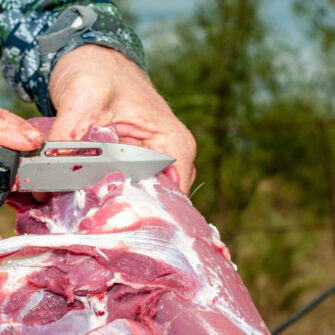
Safe Harvesting and Hunting Practices
Important Tips on How to Safely Harvest an Animal
- Do not handle, consume, or bring home wild game or waterfowl that appeared ill or acting in an abnormal manner.
- Only harvest animals that appear healthy.
- Hunters should report any signs of sick wildlife or wild bird die-off to the Nevada Department of Wildlife by clicking here.
- Wear disposable gloves when harvesting wild game or waterfowl.
- Due to concerns of Highly Pathogenic Avian Influenza (HPAI) for waterfowl, remove intestines and discard soon after harvesting. Clean only in a well-ventilated area and use eye protection (i.e., sunglasses).
- Never discard any parts of your harvest on the landscape as this can transmit disease to our wildlife. All trimmings and parts from the animal that will not be consumed should be bagged and disposed of in the municipal waste.
- Do not eat, drink or smoke while cleaning wild game or waterfowl.
- Wash hands thoroughly with soap and fresh water after handling wild game or waterfowl, including the tissues and meat. Dry hands with a disposable paper towel. If you do not have access to soap and fresh water, an alcohol-based hand sanitizer can be used.
- All clothing and gear should be washed in hot water and detergent after harvesting an animal. Knives and harvesting tools can be disinfected with a bleach and water solution. The recommended bleach water solution is ½ cup of bleach to a gallon of water.
- If you harvest any cervid (deer, elk, moose, caribou) you must follow the guidelines in the Senate Bill 85 to prevent the introduction of chronic wasting disease (CWD).
- For more information on how to properly handle and dress your harvest, visit NDOW’s Know Before You Go> Big Game> Caring for Your Big Game Harvest: https://www.ndow.org/get-outside/hunting/plan-your-hunt/
- Follow the CDC’s guidance on cooking meat.
Important Tips for Out-of-State Hunters to Prevent Human and Wildlife Diseases from Entering Nevada
- Follow the steps above for tips on how to harvest an animal while in different states or countries.
- Diseases can be transmitted from wild game to humans. Make sure you do your research ahead of time to know what potential diseases are present in different states or countries when traveling for hunts. Take proper steps and precautions to prevent the spread of disease to animals and humans.
- Contact state’s game and fish agency, wildlife agency, or department of health and human services for information on any current outbreaks or diseases present in that state/country prior to your arrival.
- Make sure hunting dogs are up to date on their vaccines, especially rabies, prior to hunting season.
- Don’t let hunting dogs come in contact with sick or already dead wildlife.
- All clothing and gear should be washed in hot water and detergent after harvesting an animal. Field gear, including boots, should be cleaned before hunting or recreating in Nevada. Knives and harvesting tools can be disinfected with a bleach and water solution. The recommended bleach water solution is ½ cup of bleach to a gallon of water.